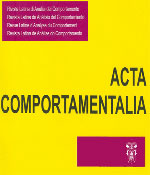Cognitive concepts and the problem of observability
DOI:
https://doi.org/10.32870/ac.v9i3.14641Keywords:
cognitive, occurrences, dispositional categories, observability, cognitive theoriesAbstract
I argue that all terms that describe acts, processes or products of knowledge have as their only referent the behavior of one or more individuals interacting witch other individual sor with natural or conventional objects. However, episodes normally described with terms such as remebering, learning, thinking, reasoning, deducing and other similar terms, do not costitute activities that can be ostensively identified. The concepts that describe cognitive episodes actually apply to the description of relations and not to particular occurrences or happenings. Because of this, although the individual acts and objects that are involves in acognitive episode are directly observable, it is not posible nor meaninful to predícate the observability or inobservability of the cognitive episode as such, for the episode constitutes a relationship of occurrence and not an occurence in and by itself. I criticaze that cognitive thcories do not distinguish between between accurrence and dispositional categories of occurrence, for which they have erroneously attributed the same obsevability criterion to episodes that are described by cognitive terms and t othe occurrences that are encompassed en such episodes.
Downloads
Downloads
How to Cite
Issue
Section
License

<a rel="license" href="http://creativecommons.org/licenses/by-nc-sa/4.0/"><img alt="Licencia de Creative Commons" style="border-width:0" src="https://i.creativecommons.org/l/by-nc-sa/4.0/88x31.png" /></a><br />Este obra está bajo una <a rel="license" href="http://creativecommons.org/licenses/by-nc-sa/4.0/">licencia de Creative Commons Reconocimiento-NoComercial-CompartirIgual 4.0 Internacional</a>.






